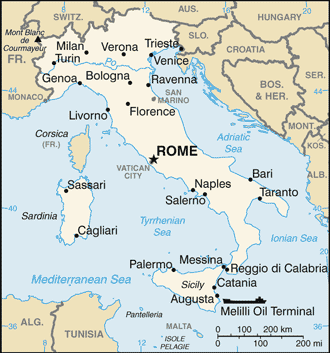 A 15-count indictment was unsealed Feb. 11 in a Brooklyn federal court, charging seven defendants with narcotics trafficking, money laundering, and firearms offenses based on what an FBI press release calls their participation in a "transnational heroin and cocaine trafficking conspiracy involving the ‘Ndrangheta, one of Italy's most powerful organized crime syndicates." Italy's Polizia di Stato simultaneously announced the arrest of another 17 in the southern province of Reggio di Calabria by troops of the elite Central Anti-Crime Directorate. The coordinated international operation for two years monitored narco-trafficking networks between Latin America, Italy, Canada and the US. The Italian hub of the ring was identified as the port of Gioia Tauro in Reggio di Calabria.
A 15-count indictment was unsealed Feb. 11 in a Brooklyn federal court, charging seven defendants with narcotics trafficking, money laundering, and firearms offenses based on what an FBI press release calls their participation in a "transnational heroin and cocaine trafficking conspiracy involving the ‘Ndrangheta, one of Italy's most powerful organized crime syndicates." Italy's Polizia di Stato simultaneously announced the arrest of another 17 in the southern province of Reggio di Calabria by troops of the elite Central Anti-Crime Directorate. The coordinated international operation for two years monitored narco-trafficking networks between Latin America, Italy, Canada and the US. The Italian hub of the ring was identified as the port of Gioia Tauro in Reggio di Calabria.
Defendants had allegedly been plotting with Mexican contacts to bring cocaine from Colombia to Europe and North America via Guyana, laundered in pineapple and frozen fish shipments. The scheme began to unravel when vessels coming from the same Guyanese shipping company were seized in Malaysia with more than $7 million in cocaine concealed in pineapples and coconut milk.
The FBI said defendant Franco Lupoi of Brooklyn "used his close criminal ties to both the Gambino organized crime family and the ‘Ndrangheta...to pursue criminal activity that stretched across the globe." Lupoi's father-in-law, Nicola Antonio Simonetta, was named as part of the Ursino clan of the ‘Ndrangheta. Members of both the Gambino and Bonnano crime families were among those arrested in New York, the FBI said—pointing to a new link between the old Cosa Nostra and the ascendant Calabrian syndicate.
US Attorney Loretta Lynch spoke in similar terms, saying: "The 'Ndrangheta is an exceptionally dangerous, sophisticated and insidious criminal organization, with tentacles stretching from Italy to countries around the world." She added that the ring was part of a "growing trend on the part of the ’Ndrangheta to expand beyond the Calabria area," but that the arrests had "put an end to the Ndrangheta’s attempts to get a foothold" in New York. The operation was code-named "New Bridge," apparently to emphasize that the old "Pizza Connection" cocaine-and-heroin ring of the 1980s, that linked Italian mobsters (in that case the Sicilian Mafia) with New York distributors, had been rebuilt. (LAT, CNN, NYP, Gothamist, QN, America24, Feb. 11)
It has been nearly a deacde since European police named the 'Ndrangheta—long seen as a regional Calabrian machine without the globe-spanning connections of Sicily's Mafia—as the continent's leading crime syndicate. This was almost certainly blowback from the Kosovo war of 1999, when NATO-backed ethnic Albanian rebels of the Kosova Liberation Army (KLA) turned to the dope trade to fund their separatist struggle against Serbia. This same period saw Albania (bordering landlocked Kosova on the west) emerge as both Europe's top cannabis producer and a key transfer point for Turkish heroin. Calabria, just across the Italian peninsula from the Adriatic coast facing Albania, became the western hub for this lively trade, and the export center to international markets. New money and global connections poised the Calabrian crime bosses to massively expand—eventually establishing their own links to Colombian cocaine cartels.
The 'Ndrangheta continues to rule in Calabria in near-feudalistic manner, linked to vicious exploitation of migrant labor in slave-like conditions in local agriculture, and jacking up impressive death tolls in feuds between rival families. Even if—optimistically—operation "New Bridge" has succeeded in breaking the Ndrangheta's international connections, it is unlikely to mean much on the ground in long-suffering Calabria.
Cross-post to High Times
Graphic: Perry-Castañeda Library Map Collection







Recent comments
1 week 6 days ago
2 weeks 6 hours ago
5 weeks 23 hours ago
6 weeks 6 hours ago
10 weeks 13 hours ago
13 weeks 5 days ago
17 weeks 6 days ago
18 weeks 4 days ago
28 weeks 4 days ago
32 weeks 4 days ago